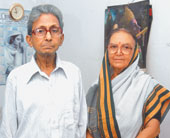 |
| Divided we stand: Haripada and Lila Das, parents of Pronob. Photo: Rashbehari Das |
It was not easy for us to go to court against our own son,” says Lila Das, a homemaker, wiping away tears that roll down her cheeks with the loose end of her white, cotton sari. “It was a painful experience. But his behaviour left us with little option but to take this drastic step.” Sitting in her room on the top floor of a two-storey house in Behala, 70-year-old Das and her husband, Haripada, 80, a retired clerk, try to justify why they decided to file a writ petition in the Calcutta High Court against members of their family — their son, Pronob Kumar Das and his wife, Anita, early last month. “We wouldn’t have thought of doing this,” says Haripada, slumped in a chair by the open widow, “unless it was a serious issue. First of all, we are middle-class Bengali people and we worry about our reputation. Why would we want to tarnish it by dragging a family feud to court if we didn’t have to?”
But what made it necessary to seek the court’s intervention, according to them, was the physical and mental harassment that their son and daughter-in-law inflicted on them. “They swear at us,” says the old lady “and have, on several occasions, pushed and shoved both me and my husband”. Among the long list of grievances that they nurse against the two are “their insensitivity to needs of other members of the family (they use up too much water, even though there is a water shortage problem) and they don’t contribute adequately to household expenses.” So much so that living in the same house with them has become intolerable, as far as the parents are concerned.
Last week, while reacting to their petition, Justice Pinaki Ghosh of the Calcutta High Court, ordered that Pronob move out of his parents’ house with his family. “Don’t ever torture your parents,” he observed. “Leave your house so that they can live happily and you, too, can enjoy life.” In order to find a humane solution the judge did not wish to take police action against the defendants, offering even to stand as guarantor in case Pronob, an employee of the National Atlas and Thematic Mapping Organisation of the central government, needed to take a bank loan to buy a flat.
“Families are held together, among other things, by the concern members feel for one another,” explains Dr Debashis Ray, clinical psychiatrist. In each family there is some amount of conflict between members that can be considered ‘normal’. But when one member’s interest clashes with another’s to the point where it becomes detrimental for another, it ceases to exist as a ‘functional’ family. Dragging family members to court is symptomatic of this malfunctioning. Instead of living in close proximity with each other, which is expected of normally functioning families, it may be better, under such circumstances, for the members in conflict to stay apart. Distance has been known to bridge gaps in communication. The verdict in this case is clearly in recognition of this. It is not punitive towards either party. It recognises the complex nature of relationships between family members. Even where the parents have gone to court, they are not really seeking punishment. The subconscious quest is for a solution.”
The problem, as far as Haripada and Lila are concerned, started way back in 1982, “soon after Pronob and Anita’s marriage”. “Our daughter-in-law didn’t come from a very well-off family, but we arranged the match because we wanted a ‘domestic’ kind of person, who would look after us too. But she turned out to be very different, thinking only about her own family,” says Haripada. Soon, Anita and Pronob moved to the ground floor with their daughter. (Earlier, according to Haripada, the entire family — including his wife, their three sons and their wives and children — lived together occupying both floors.)
Downstairs, Pronob and Anita are eager to share their own version of events, bringing up myriad issues which further confirm deep-rooted resentments. “They (her parents-in-law) have never liked me,” says Anita, crying, “because my family, being poor, couldn’t give me expensive gifts at my wedding”. She points out that while her in-laws “are clever enough not to call it dowry, they expected me to bring along a large wedding trousseau. But I disappointed them,” she adds. “My parents also make unfair demands on our money,” says Pronob. “They are under the impression that I earn a lot more than I actually do.”
Denying that they have hit, pushed or shoved the elderly couple, or sworn at them, Pronob pulls out a copy of a signature campaign signed by many of their neighbours, vouching for Pronob’s and Anita’s general ‘good behaviour’. “I had initiated this campaign to counter the charges of harassment,” says Pronob.
But Pronob is looking forward to making the changes suggested by the judge, hoping that it would be best for his family. Today, in fact, he is due to submit ‘an undertaking’ to the court revealing his plans about when he expects to shift out.











